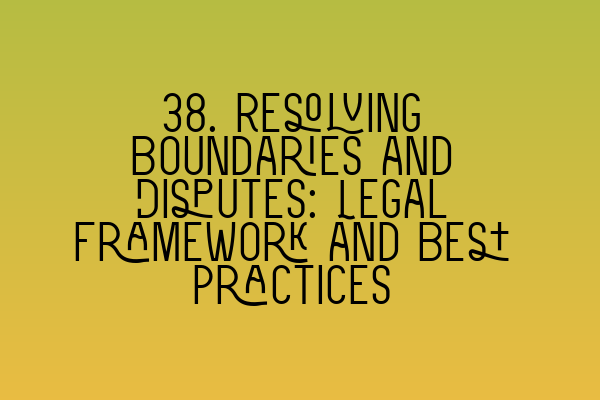38. Resolving Boundaries and Disputes: Legal Framework and Best Practices
Welcome to the SQE Property Law & Land Law blog, where we provide you with valuable insights into various legal topics. In this post, we will delve into the fascinating realm of boundary disputes and explore the legal framework and best practices for resolving them. Whether you are a property owner or a legal professional, understanding how to navigate boundary disputes is essential to protect your rights and interests.
The Legal Framework
Boundary disputes can arise when there is ambiguity or disagreement regarding the location, ownership, or maintenance of a property boundary. Resolving boundary disputes relies on a combination of various legal principles and legislation.
One of the fundamental legal principles that govern boundary disputes is the principle of ‘adverse possession.’ This principle dictates that if an individual occupies a piece of land for a specified period without the owner’s permission, they may acquire legal ownership of that land. Adverse possession can have significant implications for boundary disputes, as it can alter the rightful ownership of disputed land.
Another critical legislation relevant to boundary disputes is the Land Registration Act 2002. This Act established a system of registration for land ownership in England and Wales. When acquiring or transferring property, it is crucial to accurately register the boundaries to avoid disputes that may arise in the future.
Furthermore, common law principles and case law play a vital role in resolving boundary disputes. Previous court judgments and legal precedents help inform how courts interpret and decide on boundary disputes. Familiarizing yourself with relevant case law can provide valuable insights into how disputes have been resolved in the past.
Best Practices for Resolving Boundary Disputes
1. Communication and Negotiation: The first step in resolving a boundary dispute is open and honest communication. Engage in a dialogue with the neighboring property owner to understand their perspective and work towards finding a mutually beneficial solution. Often, misunderstandings or misinterpretations can be resolved through effective communication alone.
2. Expert Advice: If communication fails to resolve the dispute, seeking expert advice becomes crucial. Consult an experienced solicitor specializing in property law who can provide you with an accurate assessment of the dispute, explain your rights and legal options, and guide you through the resolution process.
3. Boundary Surveys: Conducting a boundary survey can help identify and clarify the exact location of the disputed boundary. A professional surveyor will meticulously examine the title deeds, maps, and physical features of the land to determine the correct boundary line. This objective evidence can aid in resolving the dispute.
4. Mediation: Mediation offers an alternative dispute resolution method where an impartial third party assists the parties in negotiating a settlement. A trained mediator facilitates productive communication, encourages compromise, and helps the parties reach a mutually acceptable resolution. Mediation can be a cost-effective and time-efficient way to resolve boundary disputes without resorting to costly litigation.
5. Litigation: In cases where all other methods fail, or the dispute is contentious, litigation may become necessary. Hiring an experienced litigation solicitor will ensure that your rights are protected and zealously advocated in court. However, it is important to be aware that litigation can be expensive, time-consuming, and unpredictable, so it should be considered as a last resort.
Conclusion
Resolving boundary disputes requires a solid understanding of the legal framework and adherence to best practices. By employing effective communication, seeking expert advice, conducting boundary surveys, exploring mediation, and considering litigation as a last resort, you can navigate boundary disputes and protect your rights and interests.
If you’re preparing for the SQE 1 or SQE 2 exams, we recommend checking out our related articles:
- SQE 1 Practice Exam Questions
- SQE 1 Practice Mocks FLK1 FLK2
- SQE 2 Preparation Courses
- SQE 1 Preparation Courses
- SRA SQE Exam Dates
If you have any specific questions or need assistance with property law or land law matters, feel free to reach out to SQE Property Law & Land Law. Our team of expert solicitors is here to help!
